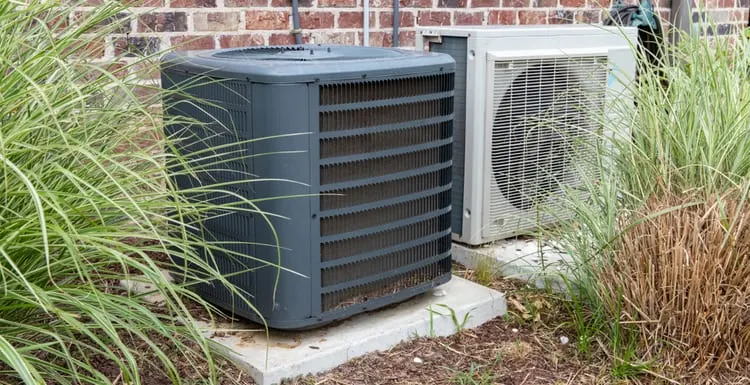Is your AC leaking water? If so, don’t panic. There are a few things to try before calling an HVAC expert.
In this guide, we’ll cover what to do and signs it’s time to call a pro. Read on to learn more.
AC Leaking Water? Don’t Worry
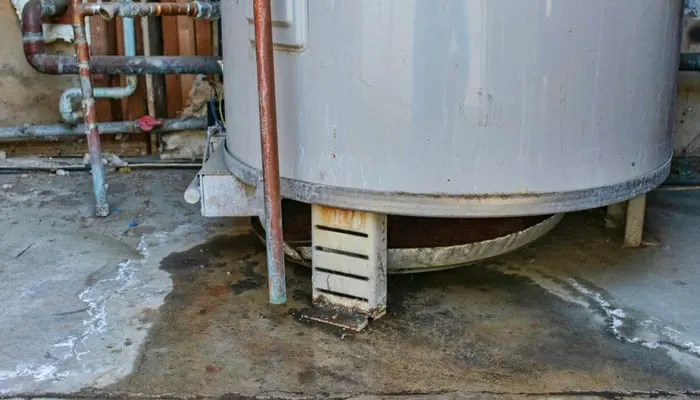
Michael Vi/Shutterstock
In the warmer months, you rely on your air conditioner to keep your home cool and comfortable. If you notice your AC leaking water, you might worry something’s gone terribly wrong.
You might notice water leaking from the inside (your furnace) or outside (your a/c condenser). Understand the difference between both, because that’s important when troubleshooting.The good news is there are just seven possible reasons for an AC leaking water. Many are simple fixes. Some indicate the need for a replacement part or unit.
HVAC systems are complicated, and little problems can become expensive disasters without a professional’s inspection and advice. Start with our guide to find out why your AC is leaking.
Then call a professional to confirm and fix the problem if it’s out of your wheelhouse. First, it’s important to know where that water is coming from and if it’s normal.
Why Is My Air Conditioner Leaking?
Air conditioners work by pulling warm indoor air over cold evaporator coils inside the unit. When the warmer air passes over the cold coils, the temperature difference creates condensation (water) on the coils.
You see the same phenomenon when droplets of water form on a cold soda can or glass of water on a warm day. So, where does that condensation on the coils go?
The air conditioner has something called a drain pan that catches the water as it drips off the coils. From there, the water flows down the condensate drain line.
What’s a Condensate Line?
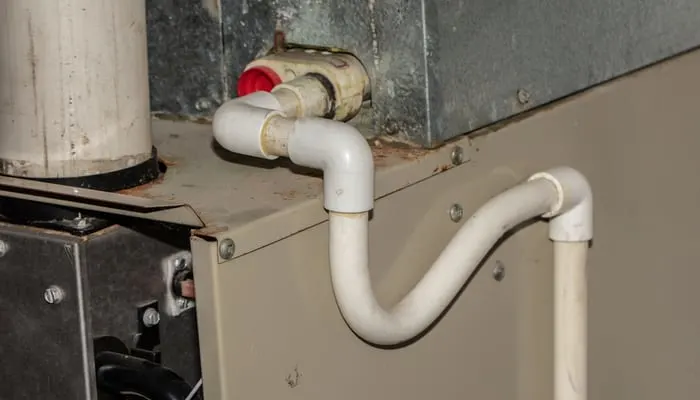
J.A. Dunbar/Shutterstock
This is just a white PVC pipe. Then, it exits your house. That’s where all the condensation goes. How does this result in cold air being blown out?
When the warm air touches the cold evaporator coils, it becomes cooler and blows into your home through your ductwork.
At the same time, the liquid refrigerant inside the evaporator coils traps the heat that was lost from the warm air. This lets the refrigerant change from a liquid into a gas.
The gas form of the refrigerant gets compressed by the compressor, then passed over the condenser to cool it down. Once it’s cool, it turns back into a liquid, and the process starts again.
Is It Normal for My AC to Leak Water?
Water dripping from the condensate drain line is normal to some extent. If it’s a really hot day and your AC is working extra hard, you might even see a puddle form outside under the pipe.
If you notice that the puddle never seems to go away or that more water is coming out than usual, it’s time to figure out what’s going on.
Likewise, if water from the air conditioner is leaking inside your home, something is amiss. Let’s look at the different reasons you’re seeing water leaking from your AC.
Troubleshooting an AC Leaking Water
IMPORTANT: Turn your air conditioner off using the thermostat before you start troubleshooting. This will help prevent any additional damage from water or malfunctioning parts.
1. Clogged Condensate Drain Line
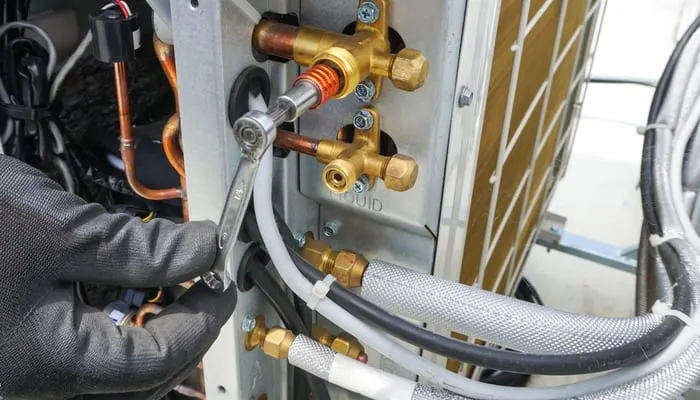
Aleksandar Tasevski/Shutterstock
The white PVC condensate drain line we talked about is a common culprit behind an AC leaking water. This is the pipe all the air conditioner’s condensate uses to flow out of your home.
If it’s not wide open, the water starts to back up or drain more slowly. If it’s clogged, you’ll see water leaking inside your home where it has backed up in the pipe.
Condensate drain lines can get clogged by many things:
- Mold
- Dirt
- Dust
- Sludge
- Pet hair
- Algae
DIY or Professional Fix?
The only way to fix this problem is by unclogging the drain line. HVAC technicians have special vacuum tools that fit inside to suck the clog out, so it’s always best to call a local heating and air service in this case.
If you want to try to dislodge the clog yourself, be careful! It’s easy to jar or disconnect the drain line, which results in an even worse leak.
2. Disconnected Drain Line
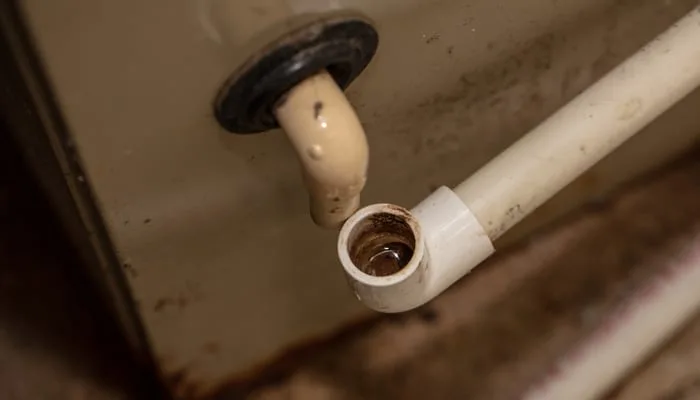
J.A. Dunbar/Shutterstock
A clogged drain line will cause a leak inside your home, but so will a disconnected drain line. The condensation that forms on your AC’s evaporator coils drips down into the drain pan and then into the condensate drain line.
Naturally, if that drain line is not connected to your air conditioning unit, it won’t flow outside. Instead, it will leak straight from the drain pan and into your home.
Disconnected drain lines aren’t terribly common, but they do happen occasionally. Your drain line might become disconnected over time as the hose loosens. It could also have been installed incorrectly.
Depending on where your air conditioning unit is in your home, you may see the leak in different areas. You might see the water pooling onto the floor or dripping from the ceiling.
DIY or Professional Fix?
A disconnected drain line should always be fixed by an HVAC professional. If your air conditioner was recently installed, it’s possible that the installer didn’t properly connect the drain line.
It may be wise to find another HVAC company in your area to ensure everything is installed correctly.
3. Rusted or Damaged Drain Pan
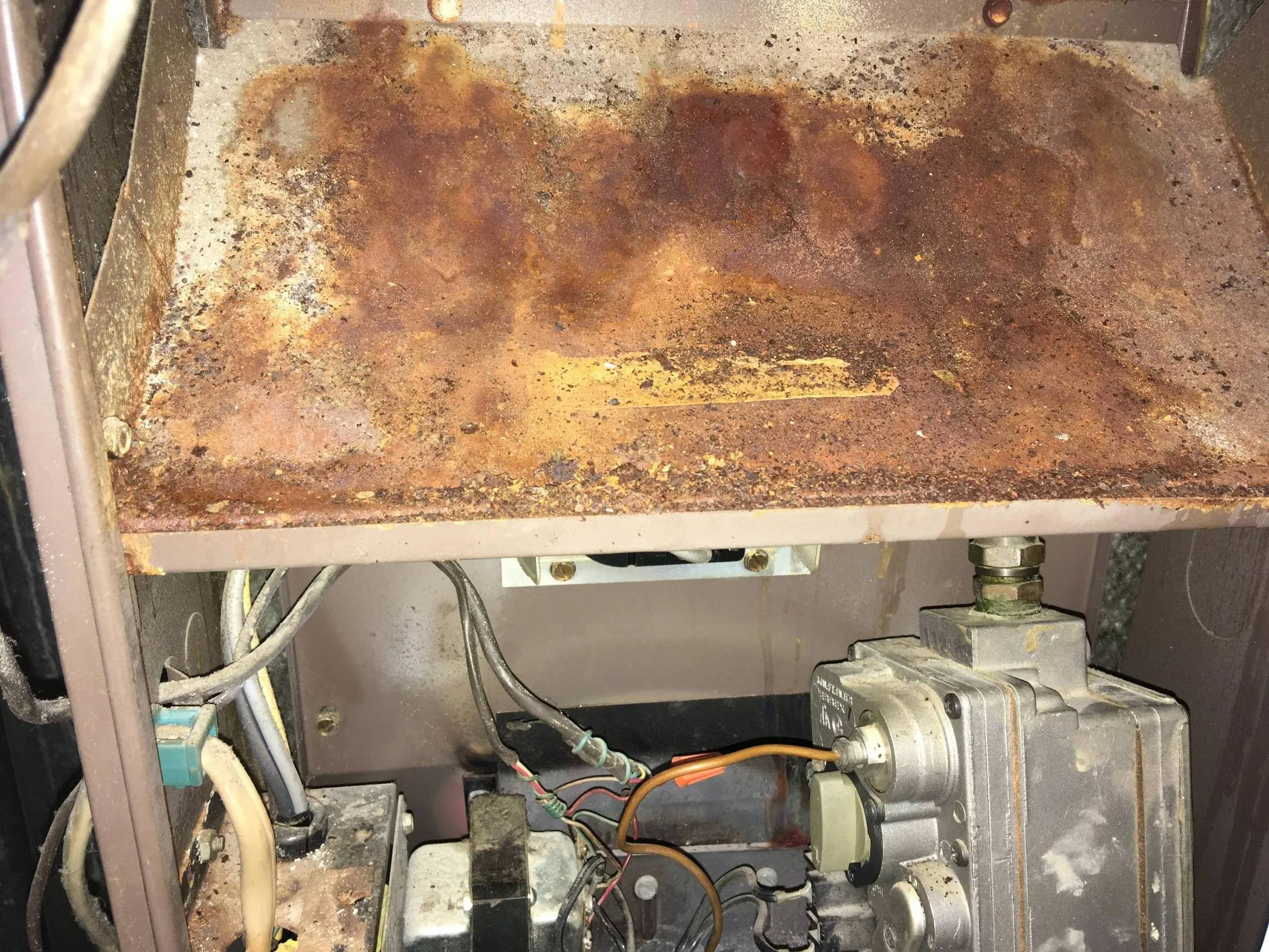
Image Source: Home Improvement Stack Exchange
Air conditioners don’t last forever. After about 15 years, the furnace drain pan, which catches the condensation that drips off the unit’s evaporator coils, can start to rust through.
The drain pan may be just damaged and allowing water to flow out of it instead of into the condensate drain line.
DIY or Professional Fix?
Unless you’re also a trained HVAC technician, you’ll need to call in a professional. Replacing the drain pan is complicated because there are two: The auxiliary and the main drain pan.
You might need both replaced, or just one. A professional will be able to do it quickly and knows which replacement pans to use.
4. Broken Condensate Pump
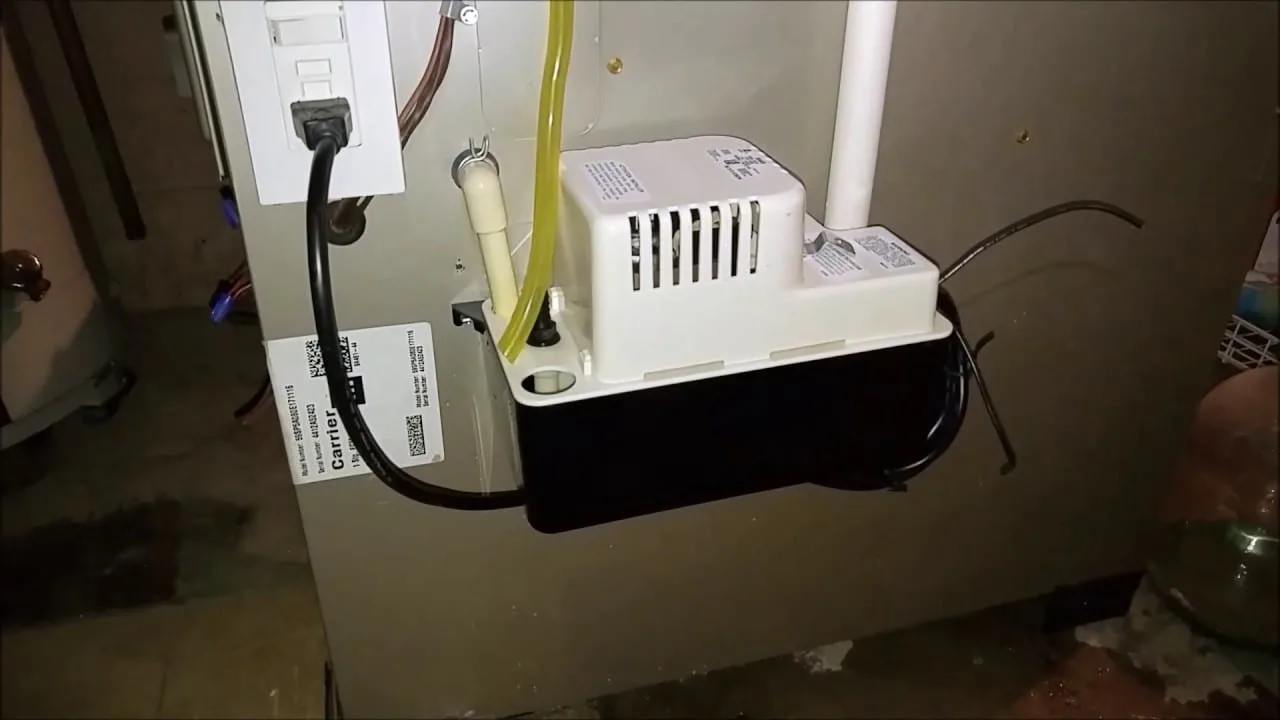
Image Source: Mi Heating Guy/Youtube
A condensate pump isn’t part of every air conditioning system. You’ll only have one if your indoor air conditioner unit is installed in a basement.
Gravity normally allows condensate to flow from the drain pan into the condensate drain line and out of your home. If your unit is in the basement, it needs a little help to move the water up the drain line and out of your home.
That help comes in the form of the condensate pump. A broken condensate pump means the water collects in the drain line and backs up into your home. This could be the source of the leak you’re seeing.
DIY or Professional Fix?
A broken condensate pump must be repaired to stop the leak. Either will require an HVAC professional’s expertise. Sometimes, they can make a small, inexpensive repair.
And this prevents you from needing to buy a replacement pump. If the pump needs to be replaced, they will identify the right replacement and install it.
5. Dirty Air Filter
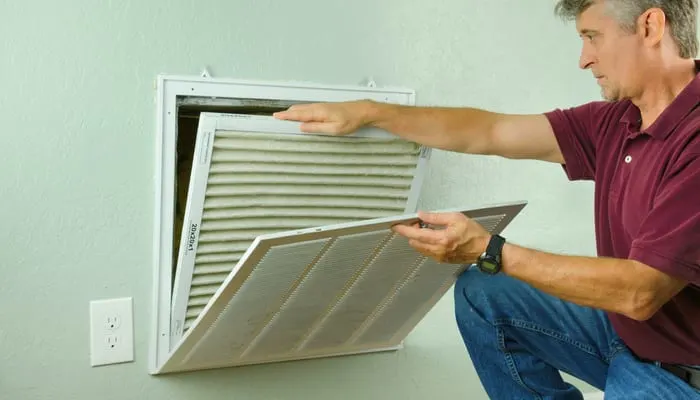
Mike Focus/Shutterstock
Above, we talked about the basic principles of how an air conditioner works. Warm air inside the home is pulled in to blow over cold evaporator coils and complete the rest of the process.
Air filters might seem like a small part, but they can be a big deal if they’re dirty. Dirty air filters don’t allow enough air to blow through and contact the evaporator coils.
If the air can’t blow through, the air conditioner has to work harder to cool – and you might see a leak. Dirty filters can cause leaks if the evaporator coils aren’t getting warmed up by the inside air.
They’re full of cold refrigerant fluid. So without any warmth to change that liquid into a gas, the coils just freeze over.
The ice that forms on the coils will eventually melt. The excess water may be more than the unit’s drain pan can hold. This is why you’ll see a leak as a result.
DIY or Professional Fix?
You can check your air filter to see if it’s dirty and might be the culprit. If it’s dirty, you can buy a replacement (make sure to get the right size) and replace it yourself.
For instructions on changing your air filter and how often to do it, read our guide on Air Conditioner Maintenance.
6. Low Refrigerant
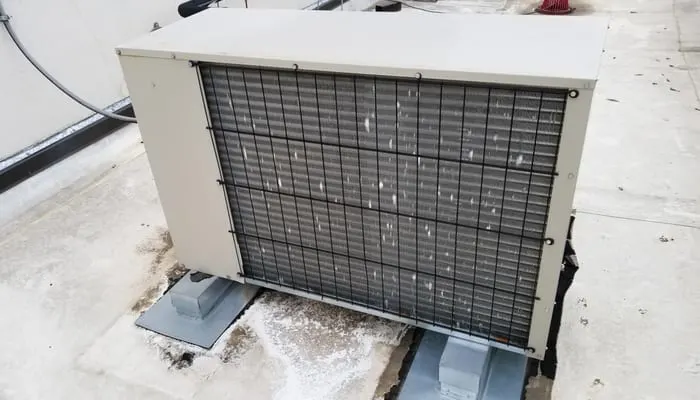
Imagenta/Shutterstock
For this issue, you’ll see the ac leaking water outside of the condenser. Remember, this is the unit outside of the house, not inside as the issues above are.
The refrigerant liquid in your air conditioner’s evaporator coils is necessary for your unit to work. Too little refrigerant will reduce the effectiveness of your AC and may even cause leaks.
The process is similar to why a dirty air filter can cause a leak. Low refrigerant lowers the pressure inside the AC unit, and as a result, the evaporator coils freeze over.
When the coil melts, the excess water flows into the drain pan. It’s usually more water than the drain pan can hold, so you’ll see a leak.
DIY or Professional Fix?
Never try to fix an air conditioner with low refrigerant yourself. A professional will need to inspect the unit to locate any leaks where you’re losing refrigerant liquid.
If they can locate it and fix the leak, they will be able to recharge your unit with more refrigerant and restore your AC operation. There should be no more leaking.
If they can’t locate the leak, you will need to replace the unit. Running an AC with low refrigerant can result in irreparable damage to the compressor.
7. Running AC in Cold Weather
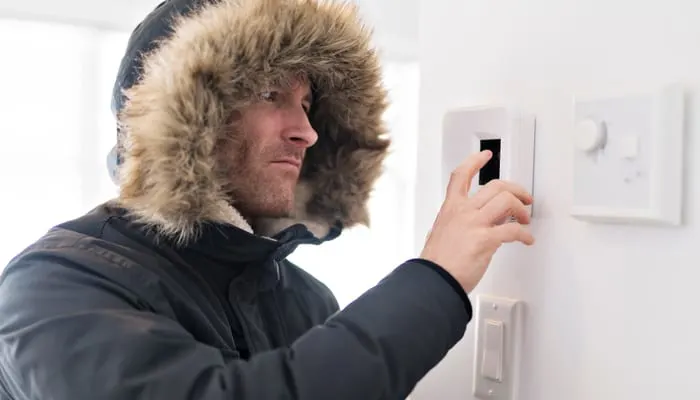
Lopolo/Shutterstock
Finally, you may notice leaks if you’ve been trying to run your air conditioner in cold weather. The operation of an air conditioner depends on warm air blowing across the evaporator coils.
Without any warm air (or if cold air is blowing instead), the liquid in the coils will freeze. This causes ice to form on the coils and completely blocks heat exchange.
Like a dirty air filter or low refrigerant, frozen evaporator coils will eventually melt and overwhelm the unit’s drain pan. This is where the leaking water comes from.
DIY or Professional Fix?
If you accidentally run your air conditioner during cold weather less than 60 degrees (switching it on instead of heat), the problem should correct itself as soon as you turn it off.
You shouldn’t see any more leaks. It’s also possible that your air conditioner continues running even when you’ve switched it off, making the air inside colder than the temperature set on the thermostat.
You may need to call a professional to fix this. Read more about this problem in our guide: Air Conditioner Keeps Running When Turned Off.
If It’s Serious, Call a Professional
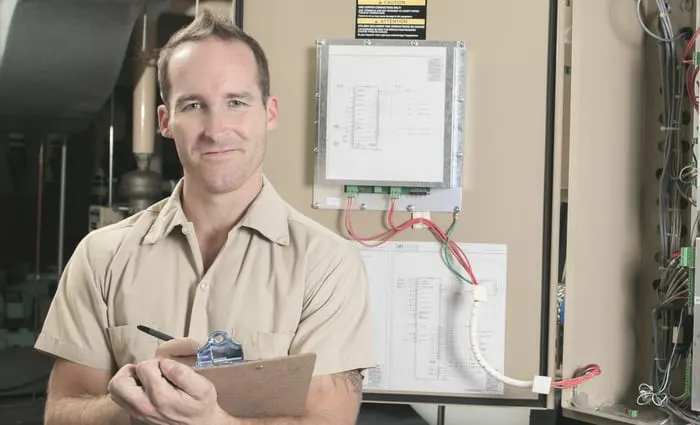
Lopolo/Shutterstock
When you notice your AC leaking water, you have to take action right away. Checking and replacing your air filter or switching from AC to heat are simple tasks that you don’t require a professional.
But problems like clogged or disconnected drain lines, damaged drain pans, broken pumps, and refrigerant leaks can be serious.
To avoid causing more damage to your air conditioner and prevent water damage from occurring, a professional’s help is needed.
The moment you notice water leaking from your AC, turn it off and call a local HVAC company to inspect and troubleshoot the problem.
Use the form below to find an HVAC company near you and get a free quote. Ignored leaks only get worse, and by calling a pro today, you can make sure the problem doesn’t get even bigger.
Why Is My AC Leaking Water?
We hope that we’ve helped cover the reason for an AC leaking water. There are a few reasons it’s happening, and solving the problem is as simple as clearing a condensate line.
However, if you miss a step or turn off the wrong system, you can cause a lot of damage, or even be injured. Unless you have experience with HVAC, it’s best to leave this type of work to the pros.

